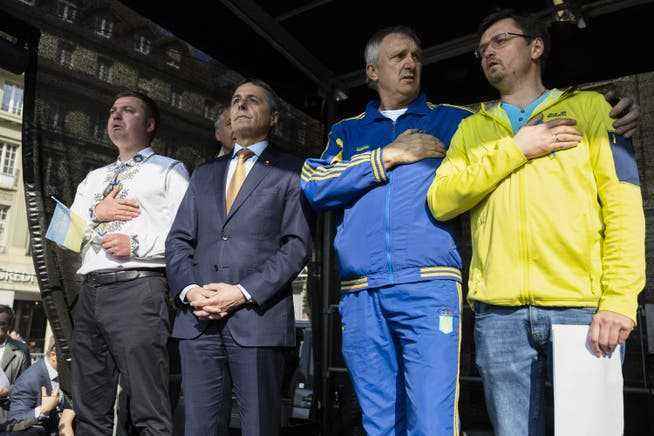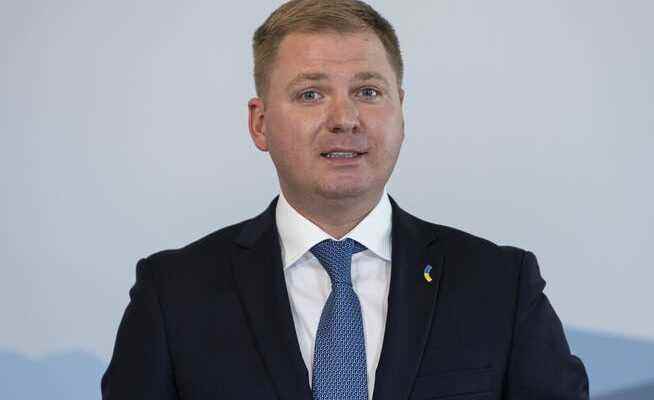Artem Ribchenko wants the donated CHF 125 million to be transferred directly to the Ukrainian state. Former Swiss Solidarity director Tony Burgener warns of corruption.
Ambassador Artem Ribchenko is vehemently defending his country’s interests in Bern.
The tone is loud, the accusation harsh: Swiss Solidarity is sitting on record sums and is holding back the donations that the Swiss people have donated to Ukraine, Artem Ribchenko said on Friday about “20 minutes”. The Ukrainian ambassador in Bern repeated the criticism in an interview with the NZZ: “If you are already collecting under the name ‘War in Ukraine’, then the money should really be used to mitigate the consequences of the war.” In doing so, he accuses the Swiss fundraising organization of a humanitarian misnomer.
The statements were noted with astonishment at Swiss Solidarity and partly also in the foreign department (EDA). Is Ribchenko playing Andri Melnik? In the first months of the war, the former Ukrainian ambassador to Germany regularly caused red faces in Berlin. Melnik accused the Scholz government of supplying insufficient war material. Eventually, the diplomat was dismissed by President Volodymyr Zelenskiy. In his environment, according to the Ukrainian media, there is already speculation about Ribchenko’s future. However, the ambassador himself does not want to comment on the rumors about a new appointment to the post of ambassador.
Ribchenko is going too slowly
Ribchenko seeks less limelight in Switzerland than his former counterpart in Germany. In the background, however, he also campaigns vehemently for the interests of his country. Legitimate from a Ukrainian point of view, sometimes a bit too much from a Bernese point of view. Now the ambassador has obviously lost his mind. With Swiss Solidarity, his criticism not only hits a Swiss institution, but also the Swiss self-image as a solidary community: the population is donating – as of today – over 125 million francs for the Ukraine and is being publicly denigrated as a thank you?
“Don’t get me wrong,” Ribtschenko told the NZZ on the phone: “Above all, I want to thank Switzerland for its solidarity. But the people of Ukraine have not received the donations so far. We need help now, not tomorrow.” For months he asked when the donations would finally arrive. But he received no replies. With Swiss Solidarity it sounds a little different. The ambassador had already been met in mid-May to inform him about the humanitarian support.
So far, it looks like this: According to Swiss Solidarity, 15 million francs have been raised since the beginning of the war, which corresponds to around 12 percent of the current total. They were used for 34 projects in Ukraine, but also in neighboring countries such as Poland and Romania. In other words, in those regions that have taken in millions of refugees since the beginning of the war. For Ribchenko, that’s too little done – and in the wrong place.
The greatest need for action is in the east of the country, not in the west, he says. Where the destruction is greatest, the aid organizations are not active. A look at Swiss Solidarity’s website confirms this statement. Links refer to reports from Swiss television, which report benevolently on projects in Ternopil, a city far in western Ukraine.

Ambassador Artem Ribchenko (left) and Federal President Ignazio Cassis during a demonstration against the Russian attack on the Bundesplatz.
In the particularly damaged regions, for example around the city of Kharkiv, there is currently a lack of vital infrastructure, says Ribchenko: “We want people to be able to go back to their homeland. But that requires hospitals, pharmacies and schools.” Ribchenko therefore asked Swiss Solidarity to transfer the donations directly to the Ukrainian state via the “United 24” development project. The government in Kyiv knows best where the funds are really needed. Swiss Solidarity does not want to respond to precisely this requirement.
The organization writes on request that it is important to ensure the independence of the aid. For this reason, Swiss Solidarity finances projects by civil society organizations that guarantee “professional and efficient implementation” and can be checked regularly. This is how you perceive the obligation to the donors. Are there fears that the Ukrainian state will misuse the local funds for howitzers instead of humanitarian aid? Answer: “Swiss Solidarity can under no circumstances provide support for military purposes, which it could not check in the event of direct support from the Ukrainian state.”
«Absolute no-go»
The expert Tony Burgener therefore describes the request by the Ukrainian ambassador in Switzerland to hand over the funds directly to Kyiv as an “absolute no-go”. Swiss Solidarity has always worked with Swiss and local partner organizations, says the 64-year-old, who managed Swiss Solidarity from 2011 to 2019. He describes the organization’s approach as “usual”. As a rule, around 30 percent of the donations are used promptly and as part of so-called emergency aid. Crisis management is still in this first phase.
The mission is difficult, also because the capacities of local organizations are limited, because the men had to enlist in the army and the women had to flee. In some cases, there is a lack of qualified personnel in the crisis regions, says Burgener about Swiss Solidarity’s approach, which may actually appear hesitant to the outside world. He also understood Ribchenko’s attitude, but was surprised at the same time. “In my time I have never seen an ambassador from a country in need intervene in such a way.”
Burgener also openly addresses another problem, one that is not mentioned at Swiss Solidarity, but also in the FDFA: “Of course, the Ukrainian state’s susceptibility to corruption does not make the help any easier.” The use of the majority of the funds, the remaining 70 percent, must now be examined all the more carefully. These are to be deployed over the next three to five years. “The help should continue to work even when no more donations are being made,” says Fabien Emmenegger, Swiss Solidarity’s head of media, to “20 minutes”.
Ribchenko acknowledges fears that the money could be used for the army. He proposes a joint approach: “Let’s define two or three key projects that we’ll tackle. Then it is clear where the donations go.” And Swiss Solidarity is also open. “We are always ready for further talks.”
